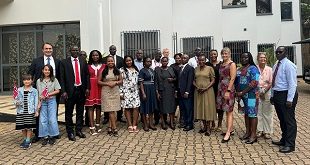
Kampala, Uganda | THE INDEPENDENT | The Ministry of Health is bothered about the few schools that are reporting COVID-19 surveillance figures, two weeks after the reopening of schools across the country.
According to data from the health ministry, only 775 schools (approximately 2.5 per cent) out of an estimated 30,519 that are registered with the Ministry of Education and Sports, are reporting COVID-19 surveillance numbers.
The figures released by the Ministry of Health indicate that on January 19, 2022, a total of 476,910 individuals were screened for the disease in schools with 45,298 of these exhibiting symptoms of COVID-19. However, no one has tested positive for the disease.
The failure of schools to report COVID-19 surveillance results goes against the school re-opening guidelines issued in December last year by the Education Ministry ahead of the full re-opening of education institutions after spending a record 83 weeks of closure.
According to the guidelines, all schools are supposed to carry out daily surveillance and send their results to a central system that can be accessed by both the Ministry of Health and their counterparts in the Ministry of education. Everybody who accesses the school must undergo COVID-19 screening.
The school management is also required to deliberately probe the COVID-19 symptoms like high temperature, flu, cough or sore throat, difficulty in breathing, loss of smell or taste and fatigue. Once someone presents with more than three symptoms, they are supposed to be isolated and later tested for the disease.
If they test positive but have mild forms of the disease, they are supposed to be isolated while receiving care, but if their condition worsens, they are supposed to be admitted to the nearest health centre that they are attached to for care.
The surveillance was developed to stop schools from hiding cases as was the case last year in June when schools became breeding grounds of COVID-19. According to the Education ministry guidelines, school headteachers found hiding suspected or confirmed cases of the disease would be personally held liable.
A total of 7 billion Shillings was recently donated by the UK and Ireland to support the safe re-opening of schools. One of the issues that the funds were supposed to address was the screening of learners and all people who access schools.
Dr Charles Olaro, the Director of Clinical Services at the Ministry of Health says the lack of information will make it hard for the health ministry to respond in case of outbreaks in schools.
“We need the information from schools to be able to support them. This information should be timely because it will enable us to identify possible hotspots on schools early and send the necessary support. We cannot do this if schools are not reporting,” Dr Olaro said.
Moses Olok, the chairperson of the District Inspectors of School Association says that the non-compliance of schools is worrying. According to Olok, the surveillance reports for the first week would be very critical as they could shade a picture of the status of learners who are just settling in.
Olok however notes that schools should not be blamed for not reporting. He says that many school administrators are not aware of the surveillance system being used since few school managers and teachers were trained and most of them were for government schools.
He adds that insufficient training has affected the way schools respond to the tool. Olok however notes that there are efforts to carry out more training.
A cross-section of private school headteachers interviewed on the tool were hearing about the need to carry out reporting for the first time. Others did not know where to send the information.
Margret Nakanooza, the headteacher of St Joseph Primary Schools says some teachers even after attending the training do not know where to send the necessary information. As a result, whatever information is collected ends up stored on phone but not sent to the relevant officers at the Ministry of Health and the Ministry of Education.
Emmanuel Ainebyoona, the Ministry of Health spokesperson says that they have already identified the gaps and currently all efforts are being forced on training to ensure that schools learn how to record and report the information as required by standard operating procedures-SOPs.
*****
URN
 The Independent Uganda: You get the Truth we Pay the Price
The Independent Uganda: You get the Truth we Pay the Price


